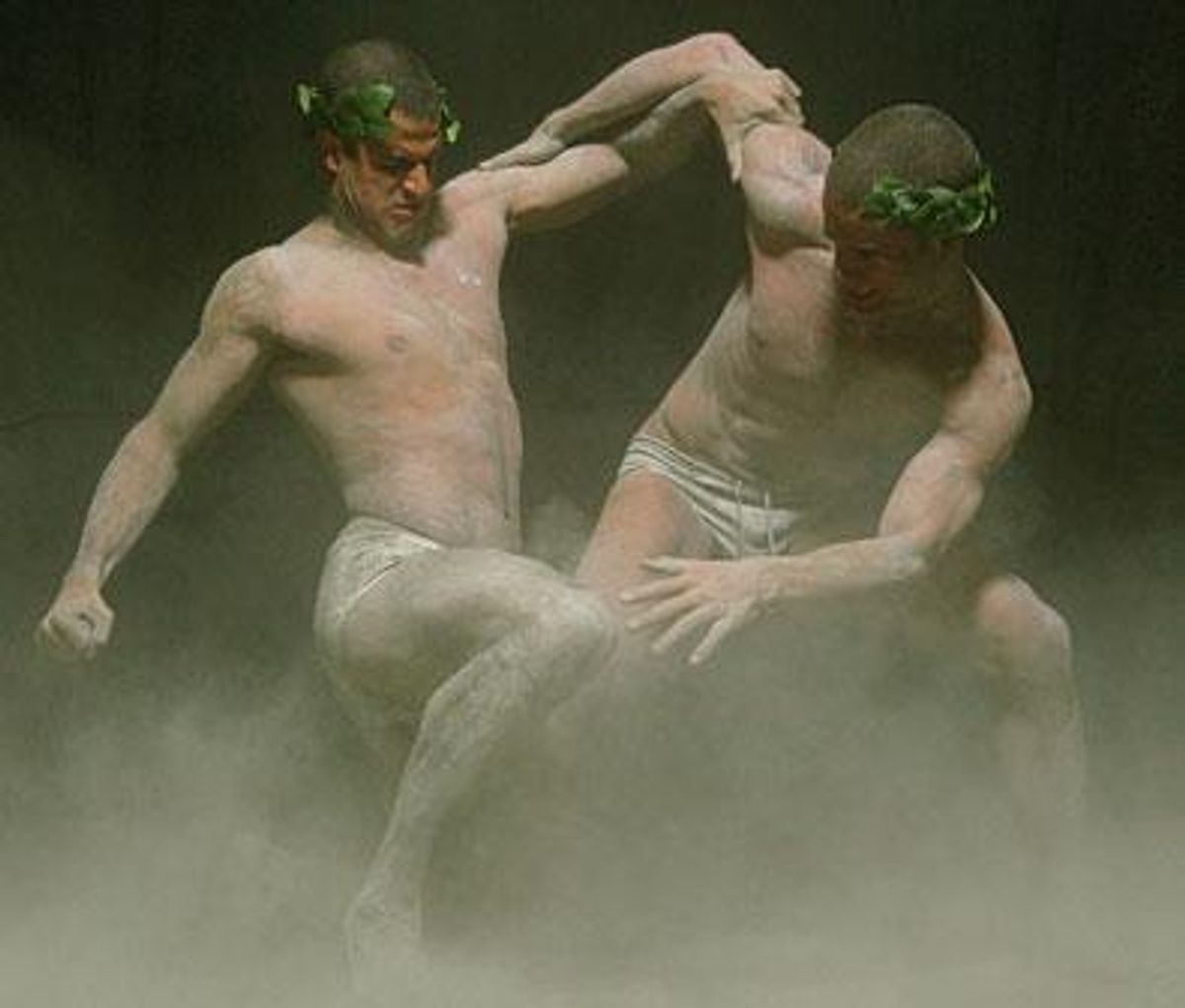CONTACTAbout UsCAREER OPPORTUNITIESADVERTISE WITH USPRIVACY POLICYPRIVACY PREFERENCESTERMS OF USELEGAL NOTICE
© 2025 Pride Publishing Inc.
All Rights reserved
All Rights reserved
By continuing to use our site, you agree to our Private Policy and Terms of Use.
A throng of schoolchildren roll across Rome's Piazza del Parlamento and, clamoring for autographs and handshakes, noisily engulf a bright figure whose long black hair, loose turquoise blouse, and flowing patchwork skirt toss gently in the breeze. The unlikely object of their adulation is Vladimir Luxuria, Italy's first and only transgender member of parliament'who, before her 2006 election, was best known as founder of Rome's avant-garde gay nightclub Muccassassina ('The Cow That Kills'; it's just as absurd in Italian).
'Study hard and get good jobs!' she exclaims and begins to walk away. The school's principal, a squat man with an unruly mustache, stops her, blurting that they've come from the southern region of Puglia (one of the most conservative, least cosmopolitan parts of Italy, not far from Luxuria's own hometown) and asking Luxuria to pose for a snapshot.
Next to me stand an impeccably dressed straight couple who have witnessed this scene, their Roman chins cocked high. The man, glancing pointedly at my T-shirt and cargo pants, rests his load of Gucci shopping bags on the cobblestones, asks in English if I am an American, then says, 'USA, not France, gave the world democracy, and this is why I'm always in my heart a yankee. But I ask you, could there be a Senator Vladimir in America?' Without waiting for an answer, he adds, with gloating pity, 'Something for you to think about.'
For years I have heard travelers' tales about Italian sexuality. The stories, told with judgmental fascination, often feature a stock character who is, in his way, at least as exotic as Vladimir Luxuria: an Italian man, married to a woman, who also has sex with men. Although the wife never explicitly acknowledges her husband's same-sex involvements, she knows the score, and, amazingly, no one's all that broken up about the situation'except for out Italian gay men, who groan with heartsick recognition when you ask about such characters. 'That's why we are all single,' they complain. They also claim that as Rome and other major cities have developed avowedly gay cultures, the number of married gay Italians has dropped. (From Naples south, they say, marriage to women is still the norm for men who love men.)
Then ask one of these 'out' gay guys if his mother knows about him, and chances are he'll say she does.
What was it like to come out to her?
'Well...'
For the Good American Gay, it's tempting to dismiss married gay Italians, and the quasicloseted lot who won't tell Mamma, as hypocrites. Americans fetishize integrity. We assume that coming out is the precondition of a gay man's psychological and spiritual health. But reality is more complicated: If Italy can put Vladimir Luxuria in the senate, why can't its ordinary macho guys leave their wives and come out to their mothers?
Last fall I went to Rome looking for answers to that question. I can't pretend I solved the puzzle, but I can say that the answer involves Suetonius (by way of Michelangelo), epidemic susceptibility to cardiac arrest among Italy's older female population, and one quite suspicious pair of bright red shoes.
Roman sexuality has always been polymorphous and peculiar. In Roman Sex: 100 B.C. to A.D. 250, historian John Clarke explains, 'Romans had sex with people of different genders, in different social situations, at various stages of life.' To a freeborn Roman man, almost any sexual activity with almost any partner was morally acceptable'as long as he took the 'active' role.
Gibbon noted ruefully that, in the bedroom, only Claudius among the first dozen Caesars was 'regular.' His main source for this information was the Roman historian Suetonius, the personal secretary of Hadrian (who deified his teenage lover Antinous after the boy drowned in the Nile and who raised so many monuments to him that, of all the faces of all the human beings who lived in the ancient world, that of Antinous was the most reproduced and survives as the best-preserved). In The Twelve Caesars, Suetonius offers a litany of irregularities that makes contemporary tabloids look positively puritanical. Julius Caesar, he tells us, was publicly derided as a hungry bottom. 'He was every woman's man,' sneered one of his political enemies, 'and every man's woman.'
Suetonius, like the rest of the classical world, assumed that every man was bisexual. Nero, who 'gelded' a boy named Sporus and married him, liked to play a sex game where he would dress in furs, pretend he was a wild animal, and 'assail with violence the private parts of both men and women.' He believed that all guys liked getting 'defiled' sometimes but that 'most men concealed that vice, and were cunning enough to keep it secret.'
Italians don't learn this stuff in school. Still, the paradox of semisecret, outrageous sexual openness infuses Roman history, and Christianity's revision of official mores did not eradicate that aspect of this culture. Many churches in Rome are repositories of prodding homoerotic impulses. Walk into the musty, faded baroque interior of Santa Maria del Popolo and gape at Caravaggio's frankly sexual Conversion of Saul. Talk about a hungry bottom: Next to his horse, the future apostle Paul lies prostrate on the road to Damascus, legs up and spread, as the Holy Spirit overtakes him. The rough textures of his horse's coat and heavy flank, and its clear-eyed, implacable expression, add to the eroticism of this pivotal moment in the Christian story of God's relationship with man.
Or approach The Risen Christ in the gloomy Santa Maria Sopra Minerva, built on the site of an ancient temple to the pagan goddess of wisdom. The sculpture, described in every guidebook I've seen with dour phrases such as 'most persons' least favorite work of Michelangelo,' is probably unpopular because it shows Jesus naked. (Or, almost: Counter-Reformation prudes clapped a metal kerchief on his penis.) Even more unsettling, he's hot.
Although Michelangelo had an almost relentless tendency to render biblical figures as mesomorphic gym queens, in this case a hot Jesus makes theological sense. Having just risen from the dead, the Lord's flesh might well be bursting with strength and vigor, as he's depicted here. The sculptor even made the Savior arch the small of his back to accentuate the shape and strength of every muscle from Jesus' trunk down.
The Risen Christ is one of the freshest, most powerful images of resurrection you will ever see. It also has what may be history's best butt.
Under the crystal chandelier at Garbo, a faux-rustic bar in Rome's artsy Trastevere district, the hunky captains of Gruppo Pesce, Rome's gay swim club, sip cocktails of Martini & Rossi, Cointreau, and vodka with a gang of friends. They're sharp, attractive guys, happily vamping as they clink glasses: 'Cheers, dears, thank God we're queers!'
Just don't ask them to stay out past 2 a.m. Tomorrow is Sunday, and Sunday, for most of this crowd, is set aside for visiting mom'which no one seems to dread at all.
Lorenzo, a 45-year-old Jude Law type who works for the Italian government and is one of the few gay Romans I met who has actually come out to his mother, says, 'I want to listen again and again to her stories, and the things about the war. Because one day she will not be here more. Living in her world, it's not a waste of time.' The tone is hushed, heartfelt, moving, and a little weird.
The typical Italian man, gay or straight, doesn't move out of his parents' house until he's in his mid 30s. 'We call that 'Mamma Hotel,' ' says Massimiliano Canneto, a diminutive 34-year-old gay tour guide with a broad, round face like a fava bean. The rainbow-bedecked Web site of his business, Roma With Pride, proclaims, 'I am happily out,' though not, he confesses over dinner one night, to 'Mamma.' With a wave of his hand, he says, 'She is old and don't know about Internet.' Then he turns serious: Although he's pretty sure his mother knows he's gay, he can't tell her because 'it could kill her, I think. Broken heart. I don't think that she could take it.'
Another day, at lunch, a young Sicilian explains, chuckling, 'They are always weak-hearted, the Italian mothers, for some reason. They could die at any moment.'
Scarcity of real estate also sustains the 'Mamma Hotel' arrangement. There can be no gay neighborhood in a city like Rome because salaries are too low and rents are too high for more than a small minority of young professionals to support themselves. (Scattered across the city, Rome has three gay saunas, one gay restaurant, and about 10 gay clubs. Garbo's yuppified atmosphere is rare. Most bars, like the twink-packed Coming Out or the harder Hangar, have a grittier edge.)
This economic stagnation creates domestic flexibility. Because the young have no place to go, their families can't throw them out, which makes families extremely resilient. It also makes dating all but impossible'which is why many Romans mostly make do with sex, often in dark rooms and saunas.
Compare 'Mamma Hotel' to America's urban gay culture'in which announcements of sexual orientation enlarge, for many, the distance that's created when we leave home. In our 20s and 30s, that distance grows larger as gay men join the upwardly mobile class of their peers, carving out individualistic identities based on economic consumption (and, often, some kind of therapy before finally beginning the lengthy process of reconciling with our parents). Which culture is more restrictive? Which is more free? For all its limits, Italian gay life safeguards something valuable that many in America struggle to find: a sure sense of involvement with family and community, a certainty that one is not alone in the world.
There's some fairly strong evidence that gay Italians could come out of the closet without jeopardizing their security. Polls indicate that 69% of Italian Catholics (in a country where well over 90% of the residents identify themselves as Catholic) support some form of legal recognition for same-sex couples. More to the point, the majority of Italians say they wouldn't mind if their children were gay. Which forces another question: Do Italian men carry their secrets around with them for no reason?
That depends on what you mean by 'reason.' If Romans tell themselves they choose the closet to keep their families happy, perhaps that's because it lets them understand the choice as something wholly under their control. They're also being swayed by at least two deeper influences. They talk about the first one incessantly: the much-reviled pope ('il Papa'), about whom more in a moment. The second, I think, is a particular experience of history Romans so take for granted that few could describe it, even to themselves.
In any neighborhood in Rome, you are liable to come upon a hole in the ground that's about 2,000 years deep. One day near the Piazza Navona, I walked out of a convenience store and looked down to ruins from Domitian's reign. If you lived here, you would see this kind of thing every day, which would make it just about impossible to trick yourself into believing the best, most productive, most inspiring American myth: that you can reinvent yourself. Most of the clean breaks and fresh starts that propel the plots of an American's coming-out story are not viable, or even imaginable, in a Roman's life. If you lived here, you would always know that you will always be what you always were.
'The holy papa do not shop at Prada,' the commander furiously insists.
This man, whom I'll call Carlo, is a commander of the Vatican, the scion of one of the handful of aristocratic Roman families who have kept the traditions of papal protocol for generations. He is gay, but he says that no one in his family or at his workplace knows. Charming, charismatic, and built like one of Michelangelo's Bible-boy fantasies, his poise falters only once, at the beginning of our conversation on a rainy afternoon in a caf' on the Via Veneto, because there must be no confusion on this point: The holy papa do not shop at Prada!
'But maybe Prada'maybe!'she make a gift to the holy papa.' His eyes flash like a little boy who thinks that because most of his body's hidden behind the sofa he is entirely invisible.
Gay Italians, almost to a man, talk about the pope's red shoes when Benedict XVI comes up in conversation, which is all the time. Everyone (except for the commander) says that Papa got his shoes at Prada, and when you ask why this matters, they say it proves he's hypocritically materialistic.
And gay.
This is one of Rome's biggest surprises: the ubiquity of rumors that the holy father is one of us. Gay and straight people alike will calmly assert this as a matter of fact, with none of the wishful overconfidence or nervous doubt that dogs West Hollywood gossip about the sex lives of movie stars.
Fabio Canino, Italy's most popular gay TV personality (a toothy, beefy Graham Norton), opened his show the day Cardinal Joseph Ratzinger was chosen pope with a shot of pink smoke emerging from a chimney. 'He loves shopping, and I love shopping,' Canino says with a smirk.
Casually, he adds, 'Everybody knows he is gay, and his boyfriend is his private secretary.' He Googles 'Georg + segretario di Papa' to show me a photo of the dashing blond Monsignor Georg G'nswein, a 50-year-old amateur pilot, tennis player, and former ski instructor, whom the Italian press has compared to George Clooney and Hugh Grant.
When I ask Carlo the commander about these rumors, he says, 'I don't know if the Cardinal Ratzinger was gay. Maybe, maybe no. I know the holy papa is not gay.'
What does that mean?
His eyes flash again; he speaks slowly, as if he is reading from a page, and his words curl like paper in fire: 'The holy papa is reborn in the Holy Spirit.'
Certainly the vast majority of people who repeat these rumors make an overly imaginative inference from the known homoerotic qualities of Catholic clerical life. Della parrocchia ('of the parish') is Roman slang for gay, and practically every gay man here has at least a few stories about dating, having sex with, or getting hit on by priests.
Fabio Canino says he received a mysterious invitation a few years ago to lunch at the Vatican with a cardinal. 'I walked in,' he remembers, 'and I thought the person in front of me was a drag queen, not a cardinal.' He flings his arms up in imitation and cries out, lisping, 'Hel-lo, sweetie!'
The prelate, he says, eagerly dished his Vatican colleagues, referring to one black cardinal as 'Naomi' (after Naomi Campbell). As Canino tells the story, he called the cardinal a hypocrite and asked how, as a gay man, he could serve this homophobic institution. The cardinal looked at him across the lavish table where they sat and said, 'I have everything here.'
Before Canino left, the cardinal'like a politician, or a parent'told him to get in touch if he ever needed help. Some time later, when Canino produced a play in Rome, the production was stuck without a rehearsal space. Canino says he called the cardinal in desperation and was immediately granted the use of a room in the Vatican. He says the cardinal also arranged for the Vatican printing office to produce, for free, the souvenir script that was sold at the play to raise money for a local AIDS foundation.
The title of the play? Making Porn.
When Vladimir Luxuria began her campaign for parliament, Italians thought it was a stunt''like Cicciolina,'she says, referring to the porn star who served briefly in parliament in the late 1980s. 'Unfortunately,' Luxuria jokes, 'she is more beautiful than me.'
Alessandra Mussolini, Benito's granddaughter, attacked Luxuria on television, sniping, 'Better to be a fascist than a fag.' Luxuria fought back, debating her on national TV, and won public recognition and respect. Subsequently Luxuria was chosen for a leadership role in her party, and she has proved such a canny negotiator that she helped secure the country's first antidiscrimination and hate-crimes laws for gays.
The next fight is for civil unions, but she knows she's taking on a ruthless enemy. 'The problem is the Vatican,' she says. 'They don't want to acknowledge the right of gays to form a family, to be an atom of our society. But Article Nine of our constitution says the Vatican and parliament are distinct. And I am reminding my fellow senators of that.'
Luxuria, like most of the activists I met in Rome, says civil unions will have a better chance of passing if more gays come out. 'If you hide, then all the issues in society can be hidden,' she says. 'It's a political responsibility to be open about reality.'
Luxuria's words come back to me one sunny afternoon on a walk with an American who lives in Rome as an illegal alien, a gangly, erudite man who brings Ichabod Crane immediately to mind. Meeting him is, in several ways, an unexpected appointment with reality.
He prepares me for my visit to the Vatican by describing a few details that most tourists overlook. In the crypt of St. Peter's basilica, for instance, just down the hall from John Paul II's final resting place, lies the tomb of the 13th-century pope Boniface VIII, who may have murdered his predecessor, Celestine V, and who was tried posthumously for heresy. At his trial, Boniface's valet testified that the pope had sodomized him, explaining that he gave it up for Papa because it was a feast day. In life, the pope had publicly proclaimed, 'It is no more a sin to lay with women or with boys than to rub one hand against the other.'
After we laugh ourselves silly over this and other venal chapters of church history, Ichabod surprises me, saying, 'For all of that, it's hard for me to be cynical about the church.'
He has AIDS, and he does not have health insurance. His treatment, for free, comes from Gemelli Hospital at the Catholic University, which has a large clinic that cares for people with AIDS in Rome. When he first went there for help, he was concerned that he would be turned away because he is in Italy illegally. He is not sentimental, but his voice shakes when he recalls his physician's reassurance: 'Don't worry, we're doctors. We're here to take care of you.'
For no charge, he has been hospitalized at Gemelli. He has received chemotherapy and thousands of dollars' worth of prescription drugs for Karposi's sarcoma and other complications. The lesions on his face are beginning to fade.
He says, 'I grew up in the Bible Belt, with a great distaste for hypocrisy. The Vatican is one of the most homophobic institutions in the world and probably the most gay institution in the world, outside of gay nightclubs. And yet within that paradox there is actually a great deal of room for humanity and passion. For me, living in Italy has been about learning to live in paradox.'
I thought I understood. But I didn't, and I did not begin to understand my own ignorance until my last day in Rome. It was a rainy Monday morning when I walked into St. Peter's for the first time and, without warning, found myself crying softly but uncontrollably.
Sitting in my living room in Los Angeles one month later, I can still see the sanctuary, which, when I think about it, seems almost to verge on the miraculous. As if the vastness of that space were inside me. The gold and brown and red and white and light, arched and coffered rhythms carved in space, the endless dance of that distant canopy, an antlike priest pacing a railing high above. The Piet', its skinny dead Christ. What did Jesus have to do with this place? Almost nothing, I thought. Except: Human beings made this, and for most of these couple thousand years he has been the anchor of the story that provides a common sense of what it is to be a man. Yet that story is almost powerless to convey the human core of his significance in one way this place makes you imagine it: In spite of ourselves, we are immense. Even in our weakness, greed, rage, fear, duplicity, and resignation'all those forces that, at least as much as any virtue, created and sustain St. Peter's'we hold this kind of space in us. It can be found.
I don't know if he was talking about the Vatican in particular, or about Italian gay life in general, but the last thing Ichabod said to me before he disappeared back into the city was, 'Sometimes I think, if this is the closet, it's OK.' As cultural exoneration, the statement will not stand. Still, for that moment, in that place, there was no contradicting him.
Recommended Stories for You
From our Sponsors
Most Popular
39 LGBTQ+ celebs you can follow on OnlyFans
November 19 2024 9:39 AM
27 LGBTQ+ reality dating shows & where to watch them
March 24 2025 11:32 AM
21 times male celebrities had to come out as straight
November 19 2024 3:33 PM
17 queens who quit or retired from drag after 'RuPaul's Drag Race'
November 30 2024 12:26 AM
Love is in the air! Unforgettable gay kissing scenes from TV & movies
February 12 2025 3:07 AM
48 steamy celebrity Calvin Klein ads the gays won't forget
March 17 2025 5:42 PM
15 things only bottoms understand
October 08 2024 5:18 PM
15 gay celebrity couples who make us believe in love
October 03 2024 5:43 PM
Murray Bartlett's 8 best gay roles in TV shows & movies
February 12 2025 2:33 PM
Maturing is sexy! 11 gay celebs who prove 'twink death' is a total myth
October 21 2024 10:51 AM
More Videos
0 seconds of 2 minutes, 49 secondsVolume 0%
Press shift question mark to access a list of keyboard shortcuts
Keyboard Shortcuts
Shortcuts Open/Close/ or ?
Play/PauseSPACE
Increase Volume↑
Decrease Volume↓
Seek Forward→
Seek Backward←
Captions On/Offc
Fullscreen/Exit Fullscreenf
Mute/Unmutem
Decrease Caption Size-
Increase Caption Size+ or =
Seek %0-9
Copied
Live
00:00
02:49
02:49
Latest Stories
Jane Hilton's 'Cowboys & Queens' explores the modern American dream
March 28 2025 6:31 PM
Is Jacob Elordi's 'On Swift Horses' a new queer classic? Maybe so!
March 28 2025 4:21 PM
'Mid-Century Modern': Celebrate Linda Lavin's most iconic roles
March 28 2025 9:00 AM
'White Lotus' S3 E7 recap: What the hell is Lochlan's deal?
March 30 2025 10:05 PM
Coco Peru addresses her cut scenes from 'Mid-Century Modern'
March 30 2025 12:58 AM
Before 'Mid-Century Modern': Revisit Matt Bomer's most memorable gay roles
March 28 2025 4:54 PM
As a Grindr podcast host, Katya travels across gay etiquette
March 30 2025 8:00 AM
Before 'Mid-Century Modern': Revisit Nathan Lee Graham's iconic roles
March 28 2025 6:43 PM
Troye Sivan & Dua Lipa get 'Physical', Kesha & T-Pain give recession pop
March 28 2025 4:53 PM
Matt Bomer doesn't know if 'Fellow Travelers' would get made today
March 28 2025 3:52 PM

























































































